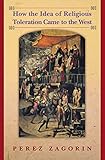How the Idea of Religious Toleration Came to the West / Perez Zagorin.
Material type: TextPublisher: Princeton, NJ : Princeton University Press, [2013]Copyright date: ©2003Edition: Course BookDescription: 1 online resource (392 p.) : 19 halftonesContent type:
TextPublisher: Princeton, NJ : Princeton University Press, [2013]Copyright date: ©2003Edition: Course BookDescription: 1 online resource (392 p.) : 19 halftonesContent type: - 9780691121420
- 9781400850716
- 261.7/2/09
- online - DeGruyter
- Issued also in print.
| Item type | Current library | Call number | URL | Status | Notes | Barcode | |
|---|---|---|---|---|---|---|---|
 eBook
eBook
|
Biblioteca "Angelicum" Pont. Univ. S.Tommaso d'Aquino Nuvola online | online - DeGruyter (Browse shelf(Opens below)) | Online access | Not for loan (Accesso limitato) | Accesso per gli utenti autorizzati / Access for authorized users | (dgr)9781400850716 |
Browsing Biblioteca "Angelicum" Pont. Univ. S.Tommaso d'Aquino shelves, Shelving location: Nuvola online Close shelf browser (Hides shelf browser)

|

|

|

|

|

|

|
||
| online - DeGruyter Monopsony in Motion : Imperfect Competition in Labor Markets / | online - DeGruyter The Lesser Evil : Political Ethics in an Age of Terror / | online - DeGruyter Trade and the Environment : Theory and Evidence / | online - DeGruyter How the Idea of Religious Toleration Came to the West / | online - DeGruyter Reliable Partners : How Democracies Have Made a Separate Peace / | online - DeGruyter Dismantling Democratic States / | online - DeGruyter Silent Voices : Public Opinion and Political Participation in America / |
Frontmatter -- CONTENTS -- PREFACE -- CHAPTER 1. Religious Toleration: The Historical Problem -- CHAPTER 2. The Christian Theory of Religious Persecution -- CHAPTER 3. The Advent of Protestantism and the Toleration Problem -- CHAPTER 4. The First Champion of Religious Toleration: Sebastian Castellio -- CHAPTER 5. The Toleration Controversy in the Netherlands -- CHAPTER 6. The Great English Toleration Controversy, 1640-1660 -- CHAPTER 7. John Locke and Pierre Bayle -- CHAPTER 8. Conclusion: The Idea of Religious Toleration in the Enlightenment and After -- NOTES -- INDEX
restricted access online access with authorization star
http://purl.org/coar/access_right/c_16ec
Religious intolerance, so terrible and deadly in its recent manifestations, is nothing new. In fact, until after the eighteenth century, Christianity was perhaps the most intolerant of all the great world religions. How Christian Europe and the West went from this extreme to their present universal belief in religious toleration is the momentous story fully told for the first time in this timely and important book by a leading historian of early modern Europe. Perez Zagorin takes readers to a time when both the Catholic Church and the main new Protestant denominations embraced a policy of endorsing religious persecution, coercing unity, and, with the state's help, mercilessly crushing dissent and heresy. This position had its roots in certain intellectual and religious traditions, which Zagorin traces before showing how out of the same traditions came the beginnings of pluralism in the West. Here we see how sixteenth- and seventeenth-century thinkers--writing from religious, theological, and philosophical perspectives--contributed far more than did political expediency or the growth of religious skepticism to advance the cause of toleration. Reading these thinkers--from Erasmus and Sir Thomas More to John Milton and John Locke, among others--Zagorin brings to light a common, if unexpected, thread: concern for the spiritual welfare of religion itself weighed more in the defense of toleration than did any secular or pragmatic arguments. His book--which ranges from England through the Netherlands, the post-1685 Huguenot Diaspora, and the American Colonies--also exposes a close connection between toleration and religious freedom. A far-reaching and incisive discussion of the major writers, thinkers, and controversies responsible for the emergence of religious tolerance in Western society--from the Enlightenment through the United Nations' Universal Declaration of Human Rights--this original and richly nuanced work constitutes an essential chapter in the intellectual history of the modern world.
Issued also in print.
Mode of access: Internet via World Wide Web.
In English.
Description based on online resource; title from PDF title page (publisher's Web site, viewed 29. Jul 2021)


